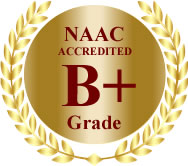| 1.1.1 Relevance of curricula planned, designed and developed/adopted Syllabus
|
|
|
|
|
| 1.1.5 Programmes incorporating digital components in curriculum |
|
|
|
| 1.2.2 Implementation of CBCS / ECS |
|
|
|
| 1.2.4 Enabling provision for modular approach Provision for modular approach for flexible exit to the learners
|
|
| 1.3.1 Institution integrates crosscutting issues
|
|
| 1.3.2 Awareness/ soft skills / life skills/value-added courses etc., on offer
|
|
| 1.3.3 Learners undertaking fieldwork / projects / internships etc.
|
|
| 1.3.4 Courses on employability/ entrepreneurship/ skill development
|
|
| 1.4.1 Feedback for design and review of curriculum Mechanism
|
|
| 1.4.2 Action on feedback (feedback collection, analysis and action taken) Mechanism
|
|
| 2.1.1 Increase in the enrolment
|
|
| 2.1.2 Efforts for reaching the unreached
|
|
| 2.2.1 Catering to rural Population.
|
|
| 2.3.1 Development of Self-Learning Material (SLM) in Print
|
|
| 2.3.2 Use of Radio for providing instruction |
|
| 2.3.3 Use of telecast / webcast for providing instruction
|
|
| 2.3.4 Availability of digitized SLMs for the learners.
|
|
| 2.3.5 Institutional Mechanism to provide academic counseling support
|
|
| 2.4.1 Full-time teachers and other academics in positionsn
|
|
| 2.4.2 Full-time teachers and other academics with Ph.D.
|
|
| 2.4.3 Programmes on offer through Collaboration |
| 2.4.4 Average percentage of participation of in-house faculty involved in preparation of SLMs
|
|
| 2.4.5 Recognition earned by full time teachers and other academics.
|
|
| 2.4.6 Teaching Experience of Academic Counsellors.
|
|
| 2.5.1 Process of conduct of Term-end examination
|
|
| 2.5.2 Examination related Grievances
|
|
| 2.5.5 - Involvement of external subject experts in evaluation process
|
|
| 2.5.3 Formative Assessment
|
|
| 2.6.2 Completion status of UG and PG degree programmes (Link to declaration of results) |
|
|
|
| 3.1.1 Policy for promotion of research
|
|
| 3.1.2 Research facilities for teachers, other academics and learners.
|
|
| 3.3.1 Innovative initiatives of the Institution
|
|
| 3.4.2: Web link of research page.
|
|
| 3.4.3: Number of research papers on an average published by teachers and other academics of the Institution.
|
|
| 3.4.4 Books and Chapters in edited volumes etc
|
|
| 3.4.5 Publications on Distance Education
|
|
| 3.5.1 Policy on Consultancy
|
|
| 3.6.1 Extension activities
|
|
| 3.6.3 Collaborative extension and outreach Programmes
|
|
| 3.6.4 Extension activities
|
|
| 4.1.1 Facilities at Institution Headquarters, Regional Centres and Learner Support Centres
|
|
| 4.1.2 Expenditure incurred for infrastructure augmentation.
|
|
| 4.1.3 expenditure incurred on maintenance of physical facilities and academic support
|
|
| 4.2.2 ICT facility in RCs
|
|
| 4.2.3 ICT facilities at few LSCs
|
|
| 4.2.4 Frequency of updating of IT facilities
|
|
|
|
|
|
|
|
| 4.3.3 Academic counselling sessions held
|
|
| 4.3.4 Annual expenditure on library.
|
|
|
|
|
|
| 5.1.2 Pre-admission Counseling Services
|
|
|
|
|
|
|
|
| 5.1.6 Academic counselling services
|
|
|
|
| 5.1.8 Special Learner Support Centres
|
|
| 5.1.9 Financial Support to learners of disadvantaged groups
|
|
| 5.2.1 Submission of assignments
|
|
| 5.3.1 The Alumni Association
|
|
|
|
|
|
|
|
|
|
|
|
6.2.2 Organizational structure of the Institution
|
|
| 6.3.1 Welfare measures for teachers, other academics and non-academic staff
|
|
| 6.3.6 Mechanism of performance appraisal system, promotion for teachers, other academics and non-academic staff
|
|
| 6.3.5 Non-academic staff attended training Programmes
|
|
| 6.4.1 Financial Management and Resource Mobilization
|
|
|
|
| 6.4.3 Expenditure by the Institution on learner support services.
|
|
|
|
| 7.1.0 Number of activities conducted for promotion of universal values.
|
|
| 7.1.1 Measures initiated by the Institution for the promotion of gender equity during the year
|
|
| 7.1.2 Gender sensitivity at work place
|
|
| 7.1.3 facilities for the management of the degradable and non-degradable waste
|
|
|
|
| 7.1.9 Sensitization of students and employees of the institution to constitutional obligations: values, rights, duties and responsibilities of citizens
|
|
| 7.1.11 - Institution celebrates / organizes national and international commemorative days, events and festivals
|
|
| 7.2 Best Practices (Link to reports given by CIQA)
|
|
|
|




